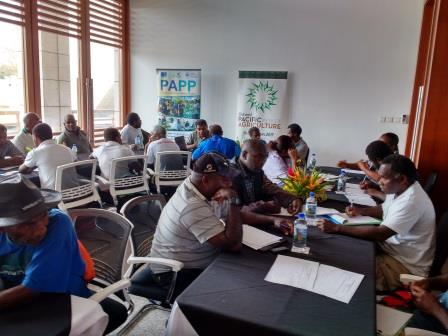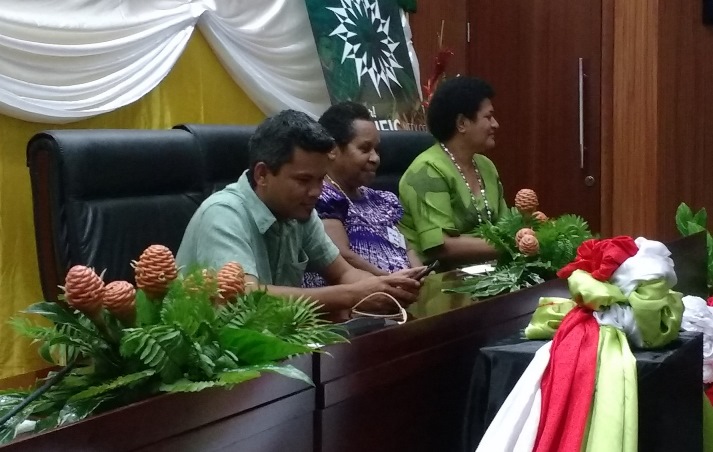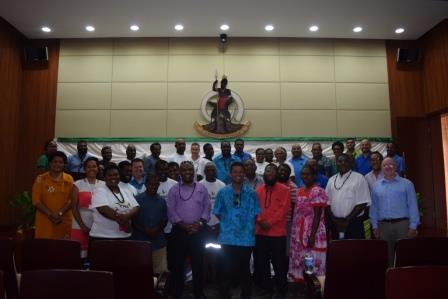24 October 2017
A strong theme of the recent Pacific Week of Agriculture was ‘agritourism’ which is the idea of better integration of agriculture and tourism nationally.
Vanuatu Minister of Agriculture, Hon. Matai Seremaiah Nawalu, Ms Maria Lini, PNG Women in Agriculture and Mrs Jiu Daunivalu, Fiji Crops & Livestock Council at the signing of the Memorandum of Understanding of Pacific partnerships for agriculture.
This means both that farmers target the hotel and resort industry as a destination for their produce, and also that farmers think about creating opportunities for tourists to come to their farms and processing centres to learn about local farming and food preparation.
During the Pacific Week of Agriculture the Vanuatu government ran a two day training workshop on ways to better link farmers to markets which included the opportunity for farmers to talk directly with chefs about their food requirements.
There were also extensive discussions about ensuring the quality and safety of fresh produce, and advice on transport and handling of produce.
Vanuatu’s Minister for Agriculture, Livestock, Forests, Fisheries and Biosecurity, the Hon. Matai Seremaiah Nawalu opened the workshop and remarked that the priority for farmers was to focus on domestic markets, including tourist markets, before tackling the more complex business of exporting. He said that supplying crops of good quality that conform to food safety standards will support the tourism industry in Vanuatu and the Pacific region.
Farmers were strongly encouraged to think about their farms as a business, maintaining good accounts and tracking their annual costs and profits. Speakers pointed out that these were essential preparations for farmers to be able to talk to banks about obtaining loans to finance business expansion.
Tourism and Agricultural industries as a whole can do much to help each other. For example, the tourism industry can flag expected visitor numbers at different times of the year, so that farmers can better target their harvest to meeting these critical periods of high demand. Secondly, agriculture can share with the catering industry its aggregated expected crop production from different areas, including clearly mapping the periods of highest supply and the shoulder seasons for different crops.
The workshop heard about the benefits of working in cooperative structures, so that groups of farmers can pool their resources to ensure the scale of supply which is preferred by tourist resorts.
One of the outcomes of the workshop was a list of priorities for building the capacities of farmers to access tourism markets. These complement the “Vanuatu Agri-tourism Plan of Action Implementation Plan”, by giving short list of priorities for farmer training for the mutual benefit of agriculture and tourism.
The workshop culminated in the signing of a regional Memorandum of Understanding between representatives of the farming networks of Fiji, Vanuatu and PNG to to proactively build relationships with key value chain actors in the tourism and productive sectors. They committed to promoting technical cooperation and economic exchanges in the agricultural sector and other productive sectors such as tourism and services and to exchanging information, sharing experiences specific to each country and assessing the possibility of applying these in their own country contexts.
The MoU was signed by representatives of the Fiji Crop and Livestock Council, the Vanuatu Agri-Tourism Steering committee, the Vanuatu Farm Support Association, the Vanuatu Neleya Eco-Farm Enterprises, PNG Women in Agriculture, PNG Women in Business and PNG Women in Coffee. See the link below for the full text.

Farmers and representatives of the tourist industries at the workshop swap notes.
Vanuatu Farmers Linking to Markets Workshop Outcomes
Draft Outcomes from workshop held as part of the Pacific Week of Agriculture, 16-17 October 2017 in Port Vila, Vanuatu.
Numbers in square brackets [] refer to the Vanuatu Agri-tourism Plan of Action Implementation Plan.
The workshop developed a list of priority areas which complement the Implementation Plan:
Business Training
• Tools for bookkeeping and budgeting
• General training on economics of supply and demand (domestic markets/tourism markets / export markets)
• Marketing based on quality standards and selling by weight
• Information Communication Technology (ICT) for agriculture – tools for sharing information on markets
o e.g.1 SMS messages of daily average market prices in Vila and Luganville;
o e.g.2 Website selling such as daily photos of farmer produce available & price and orders placed ‘on-line’.
• Training for farmers on estimating profits and costs – using a value-chain approach.
• Tools for sharing value chain information –
o e.g.1 crop calendars (growing season, ‘shoulder’ season, off-season (hothouse only))
o e.g.2 forecast production schedules (by farm, by area, by island?).
• [1.4]Undertake specific crop supply/demand analysis starting with the following:- Potatoes, onions, carrots, lettuces, capsicum, tomatoes, cauliflowers, zucchini and cantaloupe, based on typical monthly tourism visitors.
• Ways of including the middle man and negotiating with him and getting feedback from the middle man.
• Ways of estimating risk and reducing risk and preparing so that you minimise risks. e.g. cool storage especially with things like cabbage or capsicum.
Technology
• Food safety training for on-farm and post-harvest handling and packaging and transportation (Hazard Analysis and Critical Control Points HACCP)
• Training on food packaging treatment processes to increase market access (e.g. heat treatment for fruit fly).
• [1.3, 1.6]Targeted investment in production (i.e. equipment, mechanisation processes, irrigation, on-farm technology and packaging and cold storage) that improves reliability and quality of supply to tourism operators.
Extension & Training
• [1.6] Analyse current gaps in extension services and explore more cost effective extension models (including private sector/commercial models) to deliver targeted technical assistance/training to Industry Groups/clusters/lead farmers to enhance production including:
- Agribusiness management, financial planning and pricing
- Seed and crop varieties
- Organic farming
- Pest control
- Crop varieties and production techniques
- Seasonality extension, yield enhancement and quality control
- Production technology, equipment and production techniques
- Post-harvest handing. storage and crop storage
- Hotel and restaurant quality standards and purchasing procedures.
Developing tourist attractions and encouraging visitors to come to farms
• Planning for visitors and processes for managing visitors to farms and processing facilities
• Managing hazards and risks to visitors
• Linking with tourism operators.
Scaling up and forming partnerships
• Models of working together and contract farming e.g. formal and informal cooperatives, companies, associations etc.
• Organisation of farmers for better sharing of information e.g. registration of farmers; identification of specialist growers.
• Developing collective grading and packaging facilities
• Participatory Guarantee System approaches and discussions around of organic certification
• Industry meetings and discussions with farmers, market sellers and chefs.
Participants at the Vanuatu Agritourism Linking Farmers to Markets workshop
The Agritourism MoU can be read here:






CONNECT WITH US